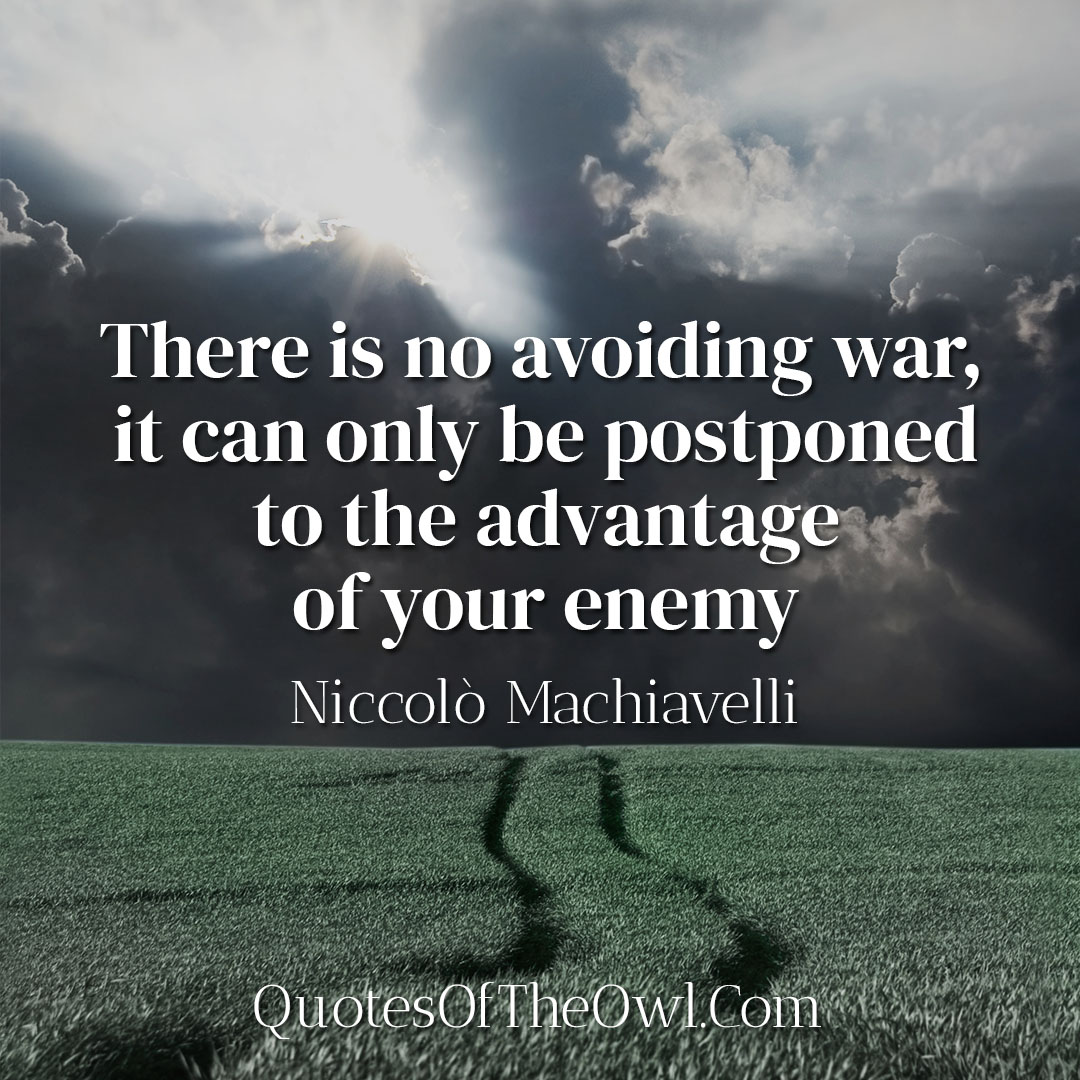Discover the Meaning behind Machiavelli’s Quote: “There is no avoiding war, it can only be postponed to the advantage of your enemy”
In the realm of political philosophy, few figures are as intriguing and controversial as Niccolò Machiavelli. His profound insights into power, strategy, and human nature have left an indelible mark on the world of politics. Among his many famous quotes, one stands out: “There is no avoiding war, it can only be postponed to the advantage of your enemy.” In this article, we delve into the deep meaning behind this thought-provoking quote and explore its relevance in today’s complex geopolitical landscape.
The Context of Machiavelli’s Quote
Historical Background
To truly grasp the significance of Machiavelli’s statement, we must first delve into the historical context in which he lived. Machiavelli, a diplomat, philosopher, and historian, lived during the Italian Renaissance. This era was characterized by intense power struggles among city-states and kingdoms. His observations were informed by the tumultuous environment of his time, where shifting alliances and ruthless tactics were the norm.
The Nature of Conflict
At its core, Machiavelli’s quote underscores the inevitability of conflict in human affairs. He recognized that conflict, whether on a battlefield or within the realm of politics, is an inherent part of the human experience. His assertion challenges the notion that peace can be maintained indefinitely, suggesting that attempts to avoid conflict only serve to empower one’s adversaries.
Unpacking the Quote
Embracing Realism
Machiavelli’s perspective is deeply rooted in political realism. He believed that leaders should not shy away from the reality of power dynamics and the potential for confrontation. Rather than naively seeking perpetual peace, Machiavelli advocated for a pragmatic approach that acknowledges the ever-present potential for conflict.
The Strategic Advantage
Central to Machiavelli’s philosophy is the concept of seizing opportunities. By stating that war can only be postponed to the advantage of the enemy, he highlights the importance of timing and strategic decision-making. Machiavelli suggests that delaying a confrontation might give the enemy time to strengthen their position, making future conflict even more challenging.
Calculated Aggression
Machiavelli’s quote also speaks to the calculated use of aggression. He believed that sometimes, engaging in conflict sooner rather than later could provide a tactical advantage. Waiting for the “right moment” could lead to a weaker position, allowing the enemy to dictate terms and conditions.
Relevance in Modern Times
Geopolitical Strategy
The wisdom encapsulated in Machiavelli’s quote continues to reverberate in contemporary geopolitics. Nations and leaders often find themselves navigating complex international relations, where the balance of power can shift rapidly. Machiavelli’s insights serve as a reminder that proactive decision-making is crucial in maintaining a strong and advantageous position on the global stage.
Diplomacy and Negotiation
While the quote emphasizes the inevitability of conflict, it also underscores the importance of diplomacy and negotiation. Machiavelli recognized that while war might be postponed, it is not the only path available. Skillful diplomacy can lead to favorable outcomes without resorting to open hostilities, aligning with Machiavelli’s broader teachings on statecraft.
Uncover the timeless wisdom of Machiavelli’s ‘The Prince’ and shape your strategic mastery today!
The Example of World War II
A notable example of the quote, “There is no avoiding war, it can only be postponed to the advantage of your enemy,” can be observed in the lead-up to the invasion of Poland during World War II. In the late 1930s, Adolf Hitler’s aggressive expansionist policies were becoming increasingly evident. As tensions escalated, diplomatic efforts were made to appease Hitler and avoid a full-scale conflict. The Munich Agreement of 1938, often referred to as the policy of appeasement, allowed Germany to annex the Sudetenland from Czechoslovakia under the pretext of addressing the grievances of the ethnic German population. While this agreement was intended to prevent war, it inadvertently bought time for Hitler to further consolidate his power and military forces. By the time the Allies realized the extent of Hitler’s ambitions, his forces were better positioned and prepared for further aggression. The postponement of decisive action in the face of mounting evidence of Hitler’s intentions ultimately played to the advantage of the enemy, highlighting the accuracy of the quote in the context of World War II.
Conclusion
Niccolò Machiavelli’s quote, “There is no avoiding war, it can only be postponed to the advantage of your enemy,” offers a profound insight into the complexities of power dynamics and conflict. It invites us to confront the harsh realities of the political arena while advocating for strategic decision-making and calculated action. As we navigate the intricate tapestry of global affairs, Machiavelli’s wisdom continues to resonate, urging us to approach challenges with a blend of realism, timing, and astute diplomacy.

